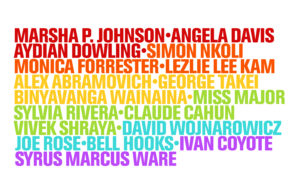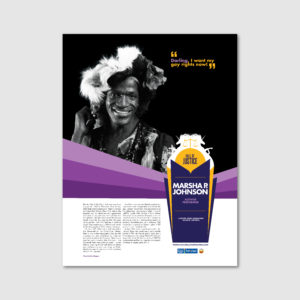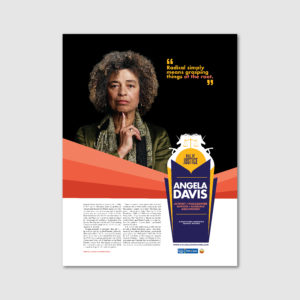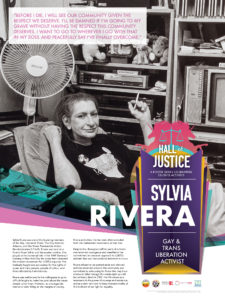John Caffery graduated from the Community Arts Practice (CAP) program in 2015 and the Master’s of Environmental Studies (MES) in 2017.
Where do you work and what do you do?
I teach at George Brown College and Centennial College, courses like Community-Based Project Design, Community and Campaign Organizing. I have also secured research funding and continue working on some of the projects I started during my master’s research.
Another project I work on the Hall of Justice Posters project. It's based on brainstorming with queer and trans activists to create 11 education posters that celebrate queer and trans activists.
These posters are in 109 high schools now, through the TDSB, and they are exhibited across the province. Now we are creating another round of posters, 7 more, with a team of three researchers and two graphic designers.
I am used to learning and doing whatever needs to be done, but it is also so nice to have a team to support a project like this. These new posters are launching in September 2020.
Tell us your work journey after the degree: what went well? What was challenging?
During my MES degree, I joked with my fellow master’s and PhD students that I didn’t want to write something that no one would read. I felt strongly that I didn’t want to do that. I felt strongly that I didn’t want to do that. I needed my work to be community-based, not on a hard-drive, but a living work. So I decided on a project called SOY HEAT, based out of the Supporting Our Youth organization which is housed at the Sherbourne Health Centre, a social justice education training program. It’s eight months long, and there are paid opportunities for youth who complete the program in a speaker’s bureau.
Challenges? A common perception is that community art is less valued than the work of the individual artist, who is put on a pedestal and is thought to work alone to create brilliance. You hear that reinforced a lot.
But it was empowering and inspiring to see other practitioners in the CAP program, like Melissa Foster and Charmaine Lurch, working in community to create things, to struggle for justice, to speak truth to power, to help communities express themselves through art. It was grounding and mobilizing to find other like-minded folks using arts-based methods to confront oppressions that they face.
How did you use what you learned? When did you feel like “I wish that they had taught me about this in university!”
I came into the program with a lot of experience, 10 years of working in the arts and in communities, but without a lot of confidence to talk about my work or navigate the academic side. I had peers with academic experience who I found simultaneously intimidating and inspiring. I found folks like (retired professor) Deb Barndt really supportive in showing me all the ways art could unfold. I had my own ideas, but in the program I was exposed to the scale of what was out there, to the history, to new methods, it was enriching. I read about other folks, and could see my work in relation to theirs – I developed a langauge to talk about my own work. I sound smarter, and that matters in this world. I learned as much from the professors as from my peers – readings, constant conversation with other folks about community arts and how it would look. It was a galvanizing experience that I had there.
Thinking back to when you were in high school, what made you want to get into this? How does what you are doing match, and differ, from what you thought?
I was bullied in high school. I skipped classes, failed some classes. I didn’t have a great home situation and I thought of myself as unfit for academic work. After high school though I did develop a passion for community work. I went to George Brown’s community worker program in 2010 and did some arts-based community work afterwards.
Now I have become an educator. I still suffer from some impostor syndrome, and pinch myself from time to time. They say that “if you love what you do you’ll never work a day in your life”, and that is where I am getting to.
Any other advice for people thinking of, for example, the environmental arts and justice degree?
My education helped me understand the broad application of the arts. There was a lot of experimenting, exploration of different methods, the chance to think about why I am making the art and what it is about. I got a clearer focus about what I wanted to do with my creative energy, how I wanted to direct my artistic pursuits. It solidified how I want to use my creativity, to use the privilege that I have. How I want to work with others to make changes that I want to see.





